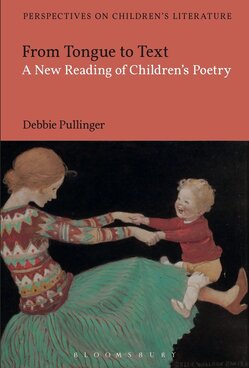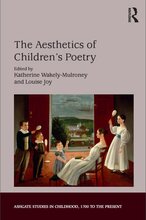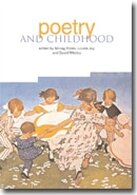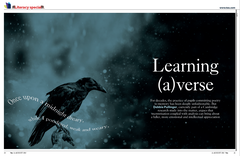Book, chapters, articles, other resources
Book
From Tongue to Text
The connection between childhood and poetry runs deep. Drawing on Walter Ong's theory of orality and on Iain McGilchrist's work on brain function, this book develops a new theoretical framework for the study of children's poetry. Engaging with a wide range of poetry from nursery rhymes and Christina Rossetti to Michael Rosen and Carol Ann Duffy, From Tongue to Text argues that the poem is a multimodal form that exists in the borderlands between the world of experience and the world of language and between orality and literacy – places that children themselves inhabit. From Tongue to Text: A New Reading of Children's Poetry was published by Bloomsbury Academic (2017) |
|
From reviews
Pullinger returns to the idea of “tactful reading” to argue that children’s poetry is best understood, not through arm’s-length theories, but through methodologies that are grounded in “commitment, immersion, abandonment, trust” This is an ambitious conclusion to an ambitious study. Its success reflects the author’s broad knowledge of contemporary British poetry as well as her willingness to draw from multiple academic perspectives. Angela Sorby, Review, The Lion and The Unicorn, 2018 |
From the back cover
From Tongue to Text is that rare thing: a book which marks an important step in critical thinking, and which is readable and accessible, and which above all is original. Peter Hunt, Professor Emeritus in Children's Literature, Cardiff University, UK. “This book is a rather thrilling call to take poetry for children seriously – that is, not earnestly, but with an appetite to see its fullest implications. Unafraid to engage with theory, the argument is anything but cerebral. Rather, it leads the mind back to the body, to its play and humour and its tactile wrestling with experience. Philip Gross, Professor of Creative Writing, University of South Glamorgan |
Chapters
Articles
Most article links are to the journal website.
If you're interested in something you don't have rights to access, ping me a request and I'll send you a copy.
If you're interested in something you don't have rights to access, ping me a request and I'll send you a copy.
Journals
- Pullinger, D. (2019) The Words of Poems are Who You Were. Children's Literature in Education. 50(1), 38-46 (OPEN ACCESS)
- Pullinger, D. & Whitley, D. (2016) Beyond Measure: The Value of a Memorised Poem. Changing English. Special Issue on 'The Uses of Poetry'. 23(4)
- Pullinger, D. (2014) Poetry Recitation: tradition, terms and conditions. Writing in Education. 63
- Pullinger, D. (2014) Infinity and Beyond: The Poetic List in Children's Poetry. Children's Literature in Education. 46(3)
- Pullinger, D. & Whitley, D. (2103) Sounding Sense: the Place, Problems and Potential of Performance in Poetry. Changing English. 20(2)www.tandfonline.com/doi/abs/10.1080/1358684X.2013.788297
- Pullinger, D. (2012). In Living Memory: The Dying Art of Poetry Learning and a Case for Revival. Changing English. 19(4)
- Pullinger, D. (2013) Ragtag Rhymes: A Tale From the Resistance. Book 2.0 2(1–2).
- Pullinger, D. (2012). Mind Reading: Thinking About Children’s Poetry. In Bridget Carrington & Jennifer Harding (Eds.) It Doesn’t Have to Rhyme. Lichfield: Pied Piper.




